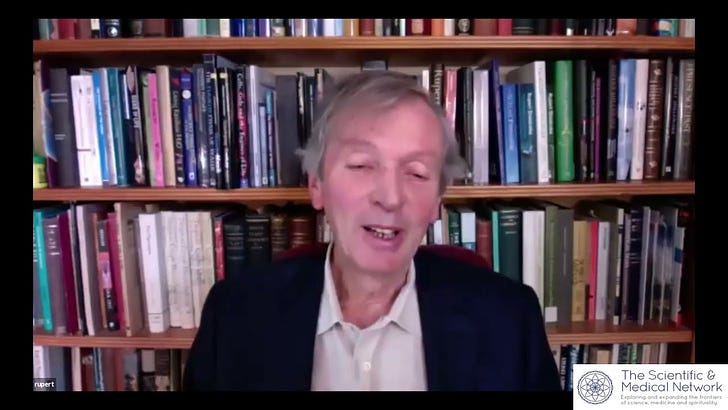Human-Animal Communication
Can we learn from animals, from our non-human companions with whom.we share the Earth? I think it is not only possible, it is also beneficial for us.
“The most important issue here is that we understand that animals are sentient, that they are not things but individuals each with a personality. That many have emotions of joy, sadness, anger, frustration, grief and can show compassion and empathy towards each other - and towards us. It is not necessary to ‘love’ them, but to understand they have as much right to their lives as we do to ours. We need to understand the role they play in the ecosystem and stop all use of pesticides, herbicides, poison baits, and so on. Any animals in captivity—sanctuaries, zoos, pets—must be treated with understanding and respect. How do we get there? Again, education that helps people to understand the true nature of animals, and all they do for us. That helps us understand the fact that heavy meat-eating comes not only as a result of horrendous cruelty and environmental damage, but that it is a main cause of climate change? “Only if we understand can we care. Only if we care shall we help. Only if we help shall all be saved.”
— Jane Goodall, in “A Journey Like No Other—A Conversation with Dr, Jane Goodall, DBE. Voiceless. The Animal Protection Institute. December 20, 2021
Can humans communicate with our non-human animal companions? Rupert Sheldrake1 thinks so. Sheldrake holds a doctorate in biochemistry (1967) from Cambridge University in England, but much more than his academic credentials is his thinking on Nature. Thinking for which he has faced criticism. Well, I am not surprised, chiefly because all original thinkers always receive negative criticism, at least initially and for some time, before their ideas are accepted. Before their ideas become mainstream. Not in every case, but it is certainly true in cases where once-ridiculed ideas have reached mainstream acceptance, because society changes and finds the new ideas as worthy of consideration..
Let’s consider this one. Sheldrake says that “memory is inherent in Nature.” That there is a “telepathy-type2 interconnection between organisms.” He also thinks that not only can animals communicate with humans, but—and are you ready for this?—that we humans will benefit from what animals can teach us. You might be wondering if you read this right. Animals teaching us humans?
Yes, you did. Animals can teach us humans many things. For one, animals can teach us humans about the benefits of humility. Yes, not our strongest suit. I, for one, have had some humility rub off on me living with Arya the Cockatiel, and from my recent encounters with Henry Newton the outdoor cat whom I feed and with whom I communicate. The chief obstacle of learning from non-human animals is that we have been told and we have learned that we humans are superior to any and all other living species. So, if this is so, why would we humans want to learn from all species below us.
But what if this is wrong? Can it be, as I think, that our superiority complex is misguided and plain wrong? It has become normalized because we have been fed a steady diet of narratives, myths and stories that tell us that we humans are the most superior of creatures, that our intelligence and our abilities place us as the top predator, that we deserve and merit such a status. That we humans ought to—and need to—dominate our Earth. Consider what Albert Schweitzer [1875-1965] writes in Civilization and Ethics (1923):3
We must fight against the spirit of unconscious cruelty with which we treat the animals. Animals suffer as much as we do. True humanity does not allow us to impose such sufferings on them. It is our duty to make the whole world recognize it. Until we extend our circle of compassion to all living things, humanity will not find peace.
Isn’t this a profound thought? One that is simple yet true, one that we can all access and understand, and one that can help us become better human beings. Every part of my being agrees. Wholeheartedly. With all of my heart and all of my strength. I have seen what humanity has done in the name of dominance. I have seen human cruelty and intolerance to other beings. It is like eating junk food every day for every meal. It is not healthy. And being on a steady diet of competition, domination and destruction has made us very ill. Very unwell; very sick So much so that we, as a species (with a few exceptions), tend to believe that such a diet is not only normal, but also healthy. Well, we can see that it is not.
The good news is that diets can be changed. Time to try a diet of caring, compassion and cooperation. It can be done. Do not listen to the naysayers. They want you to be as unhealthy as they are. But you wish to be healthy, don’t you?. Let’s face it with truth and honesty. In a world where humans have normalized lies, dishonesty and disharmony, and all manners of ill thoughts, ideas and behaviours—which, by the way, are all foreign to non-human animals—we humans will, I am certain, receive great gifts when we learn to communicate with the animals.
What happens when we begin to take in and accept what these animals have to teach us. One great gift is honesty. Another is humility. While another is gratitude. Imagine a world where us humans would place these excellent and supreme examples of animal behaviour in the top as important ways of being. Do you not agree that this would better the world immensely? I do, and without any reservation. I do so happily.
Here is a photo of Henry Newton earlier this morning; he is, as is often the case, in a playful mood, this feline beauty.
Merci et à bientôt 🇨🇦 🦜
Lifelong Animal Lover
Born at 315 ppm
Now at 425 ppm
Rupert Sheldrake: “Rupert Sheldrake is a biologist and author of more than 100 scientific papers and 9 books, and the co-author of 6 books. His books have been published in 28 languages. He was among the top 100 Global Thought Leaders for 2013, as ranked by the Duttweiler Institute, Zurich, Switzerland's leading think tank. On ResearchGate, the largest scientific and academic online network, his Research Interest Score puts him in the top 4% of scientists. On Google Scholar, the many citations of his work give him a high h-index of 45, and an i10 index of 133. For twelve years running he has been recognized as one of the 'most spiritually influential living people in the world' by Watkins Mind Body Spirit magazine. His work has been featured in many magazines, newspapers and broadcast media, including New Scientist, The Guardian, Discover magazine, The Spectator, The Washington Post, Die Zeit and on BBC Radio and television.”
Telepathy: “Animals communicate in a silent language, and humans communicate in a verbal language. This silent language is called telepathy which means feeling across a distance. Communicating telepathically with animals means we are mentally sending and receiving messages.
It involves the direct transmission of feelings, emotions, intentions, thoughts, mental images, impressions, sensations, and pure knowing. In this kind of communication you do not read body language or make guesses based on behaviour. Telepathic communication after all, is an innate ability of all beings.”
The work was originally published, in 1923, in German as Kulturphilosophie II: Kultur und Ethik. This translation is from the 1949 English-language edition. The Philosophy of Civilization. II. Civilization and Ethics. It was later placed together under one title, The Philosophy of Civilization (Prometheus; 1987).






Thanks for the article, Perry. Animals definitely communicate with humans, or at least try to. And they do with each other, certainly. Humans communicating to animals takes more time and tuning in.
Great article, Perry, starting with humility and reaching out with hope. I've read a lot of Sheldrake's work, including his thoughts on morphic resonance, so I'd like to think you're adding to this in a profound way. I've also studied with Dr Goodall who taught me that animals have messages for us if we learn to listen.